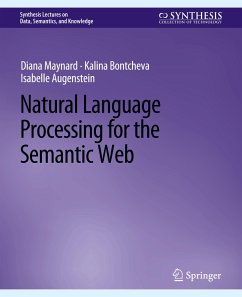
The Epistemology of Intelligent Semantic Web Systems

PAYBACK Punkte
0 °P sammeln!
The Semantic Web is a young discipline, even if only in comparison to other areas of computer science. Nonetheless, it already exhibits an interesting history and evolution. This book is a reflection on this evolution, aiming to take a snapshot of where we are at this specific point in time, and also showing what might be the focus of future research.This book provides both a conceptual and practical view of this evolution, especially targeted at readers who are starting research in this area and as support material for their supervisors. From a conceptual point of view, it highlights and disc...
The Semantic Web is a young discipline, even if only in comparison to other areas of computer science. Nonetheless, it already exhibits an interesting history and evolution. This book is a reflection on this evolution, aiming to take a snapshot of where we are at this specific point in time, and also showing what might be the focus of future research.This book provides both a conceptual and practical view of this evolution, especially targeted at readers who are starting research in this area and as support material for their supervisors. From a conceptual point of view, it highlights and discusses key questions that have animated the research community: what does it mean to be a Semantic Web system and how is it different from other types of systems, such as knowledge systems or web-based information systems? From a more practical point of view, the core of the book introduces a simple conceptual framework which characterizes Intelligent Semantic Web Systems. We describe this framework, the components it includes, and give pointers to some of the approaches and technologies that might be used to implement them. We also look in detail at concrete systems falling under the category of Intelligent Semantic Web Systems, according to the proposed framework, allowing us to compare them, analyze their strengths and weaknesses, and identify the key fundamental challenges still open for researchers to tackle.












